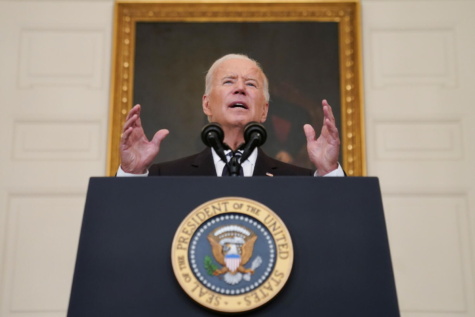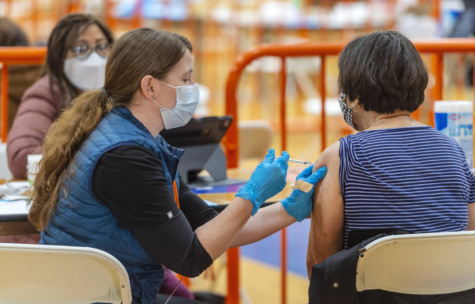
Sofia Sipelis | Opinion Editor
September 17, 2021
After what felt like an eternity of wishing for a saving grace to this pandemic, on December 11, 2020, the Pfizer vaccine was approved for emergency use by the United States Federal Drug Association. Since then, the vaccine has become available to a majority of the population. The 95% efficacy rate vaccine was expected to be the clear-cut solution to our pandemic, so long as we reached herd immunity (a vaccination percentage of at least 70%). However, hoards of reluctant citizens have held the population back from escaping this exhausting pandemic.
On August 23, 2021, the Pfizer vaccine was approved for authorized use by all adults. Yet as of today, September 15, 2021, ten months after the vaccine was approved, only about 54.24% of the American population, according to the CDC, has been vaccinated. With the remaining 45% of the population still needing vaccination, the questions are: What’s it going to take? Is it really that important?
Ignoring the fact that children under 12 are unable to get vaccinated, according to a December 2020 study from the CDC, 29.8% of people unwilling to get vaccinated are concerned about the side effects of the vaccine, 14.5% of people plan to wait for safer conditions, 12.5% of people don’t trust the government, and the remaining 22.4% of people unwilling to receive the vaccine share a variety of different concerns some being: the dislike for vaccines, a fear of needles, and doubt in the danger of COVID-19.
The controversy regarding vaccines is far from new, as a population of self-proclaimed “Anti-Vaxxers” have been a prevalent and loud minority within this nation as they demand freedom and resist government control. Anti-vaxxers share an irrational paranoia and, quite frankly, a rather selfish one. They fear for the safety of themselves and their children, and hold their freedom tightly within their fists — the same fists they raise in the air in resistance to wearing masks in public places where they may be exposed to a virus that could very well kill them and those they love.
The irony of the situation is that while anti-vaxxers doubt the safety of the vaccine, they are exposing themselves to a deadly virus that will undoubtedly put their safety in jeopardy. Furthermore, while we listen to the complaints of angry citizens who refuse to do their part in reducing the spread of the virus by taking preventative measures, we also hear angry complaints and demands for a pre-COVID life from the same people refusing to take combative measures. The only people with the right to complain about the inability to live a “normal life” are those who do their part in reaching herd immunity.

On September 9, 2021, months after Americans had the free agency to get vaccinated, President Biden announced that having the COVID vaccine would become mandatory among large companies and healthcare agencies. Companies are required to have their employees vaccinated if their staff comprises over 100 people. If people refuse to get vaccinated or are medically unable to receive a vaccine, they are required to show a weekly negative COVID test.
Biden received a large amount of backlash for a speech in which he took an approach that was less sympathetic and more forceful. Thousands of people are angry with Biden’s mandates, feeling that their American freedoms and personal autonomy are being ripped away from them. However, after months of access to the COVID-19 vaccine, it is time to make actual progress in terms of reaching herd immunity.
“I wanted to feel comfortable in large crowded areas,” sophomore Claire Hedger said after explaining her motivation for being vaccinated as soon as possible.
If the desire to live a life where party outings, concert visits, and group hugs exist is not a large enough incentive to join the vaccinated club, here are some statistics. According to the CDC, 99% of fully vaccinated people have not had a severe breakthrough of COVID-19. This means that almost everyone who is vaccinated has not had a case of COVID in which they receive treatment on a ventilator, have to enter a hospital, or have severe fevers or coughs.
“I think it’s important to get vaccinated to get back to normal life,” junior Sydney Resser said.
As a sixteen-year-old girl, who has already missed out on two years of her dream high school experience, I received the Pfizer vaccine on the day the FDA approved it for emergency use for 12-to-15-year-olds in hopes to contribute towards herd immunity.
Despite briefly feeling the negative side effects of the vaccine — headache, bodily aches and pains, and short bursts of discomfort — my symptoms were short-lived and very tolerable. Months later, I feel an utter sense of relief and pride for being vaccinated, and knowing that I have contributed to creating a healthier society.
With new variants of COVID on the horizon such as the Delta variant, already announced by the CDC to be more contagious and more severe than the original strain, being vaccinated is essential. As a society, we have come far, and although it feels like we just reached the shining light at the end of the tunnel where we live in a utopia of bare faces, large gatherings, and social proximity, I can assure you that without herd immunity, we will plummet back into the dark hole of zoom meetings, cabin fever, and quarantine. I implore you to get vaccinated if you are medically able to; it’s free and important. Do your part.

Very well done, to the point, statistically correct and bold enough to call people out on their blatant ignorance.